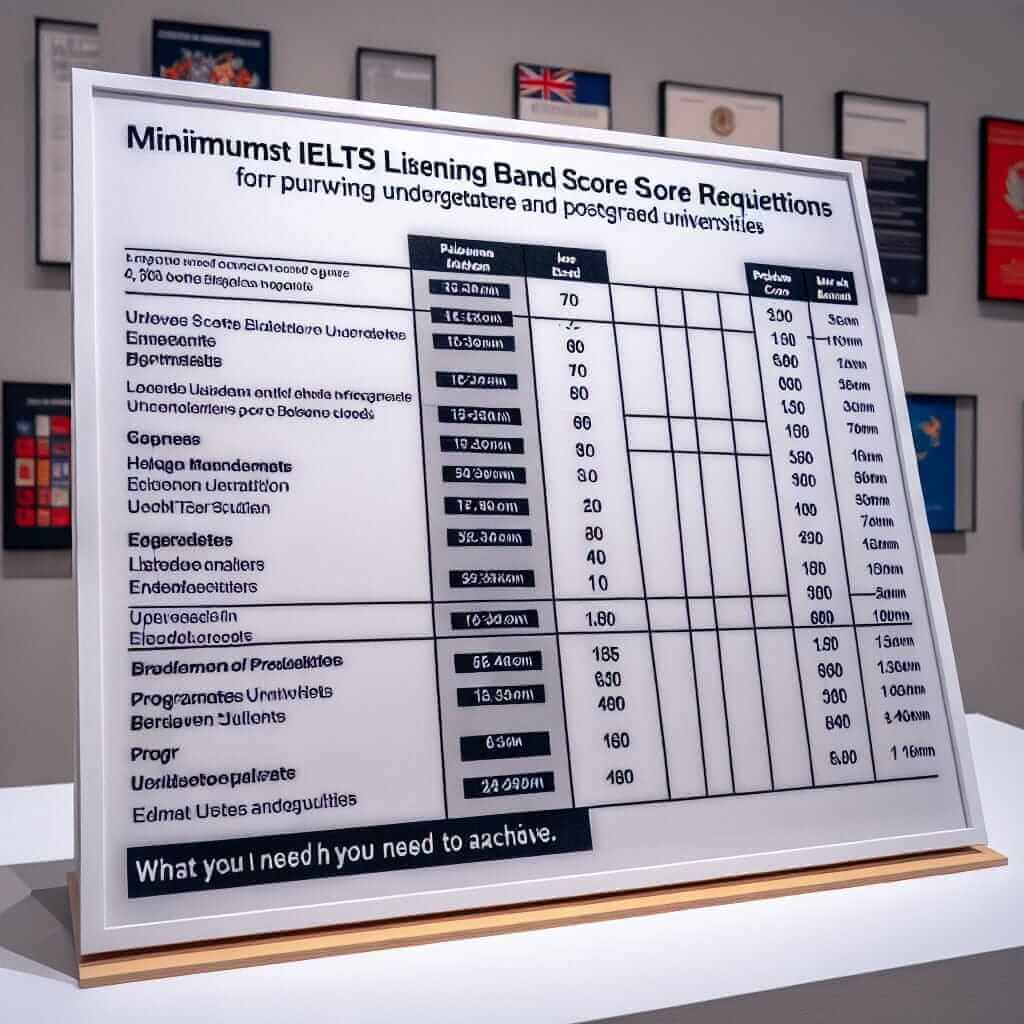When it comes to applying for university, especially in English-speaking countries, one of the essential criteria is the IELTS score. Among the different sections of the IELTS test—Listening, Reading, Writing, and Speaking—each part often has specific band requirements. In this article, we will explore the IELTS Listening band requirements for universities, understand why they matter, and provide practical tips for achieving these scores.
Understanding the IELTS Listening Section
What is the IELTS Listening Test?
The IELTS Listening test assesses your ability to understand spoken English in various settings, such as everyday situations, educational contexts, and lectures. The Listening test consists of four sections, each with ten questions, making a total of 40 questions.
Why are Listening Scores Important for Universities?
Many universities, particularly in English-speaking countries, require a certain level of proficiency in listening comprehension. This is crucial because university courses often involve listening to lectures, participating in discussions, and understanding spoken instructions.
Common IELTS Listening Band Requirements
Typical Band Requirements
Different universities have different IELTS band requirements, which can also vary by course. However, the general trend is that higher education institutions often set the following band score requirements for the Listening section:
- Undergraduate Programs: A minimum Listening band score of 6.0 to 6.5
- Postgraduate Programs: A minimum Listening band score of 6.5 to 7.0
Examples of University Requirements
Let’s look at some specific examples from various universities:
- University of Melbourne (Australia): Requires a minimum Listening band score of 6.5 for most undergraduate programs.
- University College London (UCL) (UK): Generally requires a minimum of 6.5 to 7.0 in the Listening section, depending on the program.
- University of Toronto (Canada): Usually sets a minimum Listening band score of 6.0 to 6.5 for both undergraduate and postgraduate programs.

Practical Examples & Test Tips
Example Questions
Here are some examples of the types of questions you might encounter in the IELTS Listening test:
- Form Completion: You’ll hear a conversation about renting an apartment. Fill in the missing information such as rent amount, location, and contact details.
- Multiple Choice: Listen to a university lecture about climate change and select the correct answers to specific questions about it.
- Matching: Match statements to objectives described by the speaker in a seminar about new business strategies.
Test Tips
To excel in the Listening section, consider the following strategies:
- Practice with Authentic Materials: Use past IELTS papers or listen to English podcasts, lectures, and news reports.
- Focus on Key Information: Practice identifying main ideas and key details.
- Take Notes: Develop effective note-taking skills to jot down important points while listening.
- Mock Tests: Regularly take practice tests to familiarize yourself with the test format and time constraints.
Common Mistakes to Avoid
Misunderstanding Accents and Dialects
IELTS Listening tests can include a variety of English accents (e.g., British, American, Australian). Practice listening to different accents to avoid misunderstandings.
Overlooking Instructions
Always read and listen to the instructions carefully. Misinterpreting instructions can lead to mistakes.
Poor Time Management
Don’t spend too much time on one question. Move on if you’re unsure and come back to it later if you have time.
Steps to Improve Your Listening Score
Regular Practice
- Set a Study Schedule: Dedicate specific times of the week to practicing listening skills.
- Use a Variety of Resources: Engage with diverse audio materials—such as podcasts, news channels, and TED Talks—to improve comprehension.
Use Listening Strategies
- Predict Before Listening: Look at the questions and predict the type of answers you might hear.
- Listen for Specific Details: Train yourself to pick up on specific information such as dates, names, and numbers.
Get Feedback
- Practice with a Partner: Have someone else review your practice tests to provide feedback.
- Enroll in a Course: Consider taking an IELTS preparation course to get structured guidance and professional feedback.
Conclusion
Achieving the required IELTS Listening band score is crucial for university admissions, and understanding the specifics of what is required can help you focus your preparation. Consistent practice, familiarizing yourself with different types of questions, and avoiding common mistakes are key to improving your listening skills.
Feel free to leave a comment below if you have any questions or share your own tips and experiences. For more resources and guides on IELTS preparation, explore our other articles on IELTS.NET. Good luck with your IELTS journey!